 Petzlover
Petzlover Both American Wirehair and Chantilly/Tiffany are originated from United States. Both American Wirehair and Chantilly/Tiffany are having almost same weight. Both American Wirehair and Chantilly/Tiffany has same life span. Both American Wirehair and Chantilly/Tiffany has same litter size. Both American Wirehair and Chantilly/Tiffany requires Low Maintenance.
Both American Wirehair and Chantilly/Tiffany are originated from United States. Both American Wirehair and Chantilly/Tiffany are having almost same weight. Both American Wirehair and Chantilly/Tiffany has same life span. Both American Wirehair and Chantilly/Tiffany has same litter size. Both American Wirehair and Chantilly/Tiffany requires Low Maintenance.
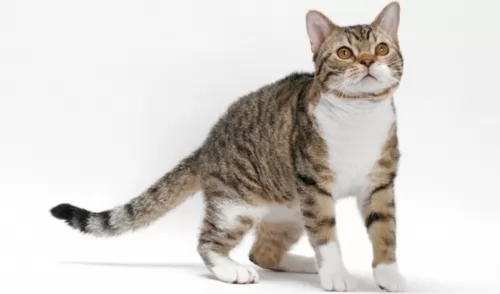 The American Wirehair started as a spontaneous mutation so that somewhere along the line, an unusual litter with this unique wiry type of fur was born.
The American Wirehair started as a spontaneous mutation so that somewhere along the line, an unusual litter with this unique wiry type of fur was born.
The cat hails from New York and it was in 1966 that a couple of barn cats had a litter of kittens, some of which were born with this peculiar wiry hair. Only one kitten survived – a male – and later it was discovered that the gene responsible for the wirehair coat was dominant so that only one parent required the gene to produce Wirehair offspring.
Today, all American Wirehairs are descendants of this one surviving male kitten. Today the breed is still fairly rare. It is, however, recognized by the four largest North American cat associations.
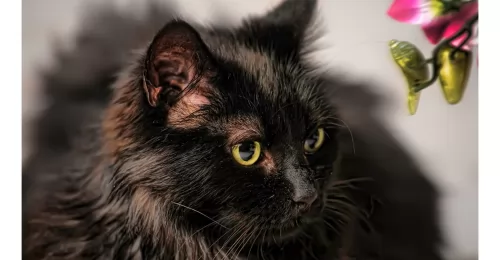 The beautiful Chantilly/Tiffany cat gets people thinking the cat is a semi-longhaired Burmese, but of course, it's not.
The beautiful Chantilly/Tiffany cat gets people thinking the cat is a semi-longhaired Burmese, but of course, it's not.
The way the Chantilly came about was that there were a pair of chocolate-colored cats but their origins were unknown. The first litter of Chantilly kittens was born in New York in 1969 and people were so taken up by the beautiful kittens that a breeding program was started.
The cat was first started as a foreign longhair and then it changed to Tiffany. In a British registry, a cat breed that was a cross between a Chinchilla Persian and a Burmese was named the Tiffanie and renamed Chantilly and referred to as the Chantilly/Tiffany.
The breed is recognized by most major cat registries.
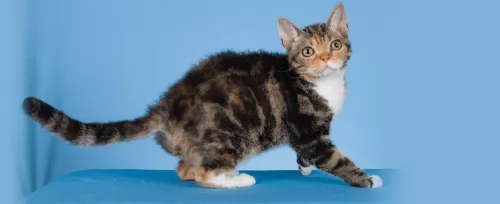 The American Wirehair is a medium-sized cat, strong and powerful, and can weight 5, 6 or 7 kg.
The American Wirehair is a medium-sized cat, strong and powerful, and can weight 5, 6 or 7 kg.
The head is in proportion to the body and the cat has a strong muzzle and chin. The ears are medium-sized and are rounded at the tips while the eyes are large, round, and set well apart.
It’s the coat that draws attention as unlike a regular cat’s silky fur, the fur of this cat is springy, coarse and wiry to the touch. The coat can be any color or pattern. It is the cat’s very coat that distinguishes it from all other breeds.
With this coat, the less grooming the better. Brushing or combing can damage it, so unless he is shedding heavily, leave it alone.
The only other care he needs really is nail trimming, to check inside his mouth for bad teeth and to also check inside his ears for redness. Both the teeth and the ears can be a source of pain for your pet.
The American Wirehair may have a harsh coat but there is nothing harsh about his personality at all. He is amicable and loving, getting on well with all members of his human family.
He is an independent cat and while he loves spending time with his family, he is quite capable of spending time on his own as well.
The American Wirehair is a playful cat so you want to give him some toys to entertain himself for when you’re not around.
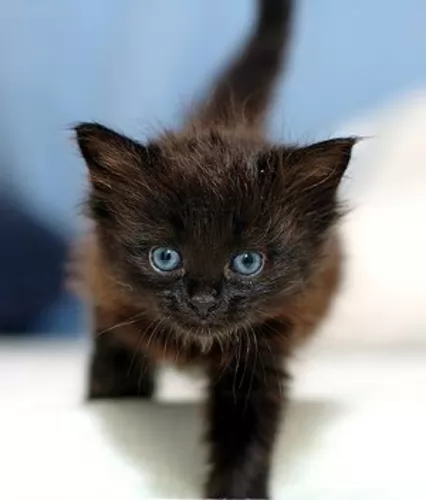 The cat has a fairly broad head with widely spaced ears of medium size. The eyes are oval-shaped and gold in color. The fur is semi-long and there is no undercoat. The tail is plumed.
The cat has a fairly broad head with widely spaced ears of medium size. The eyes are oval-shaped and gold in color. The fur is semi-long and there is no undercoat. The tail is plumed.
Apart from the original chocolate brown of the cat, other colors of the coat can include fawn, cinnamon, black, lilac and blue, with the chocolate brown being the favorite color.
The Chantilly promises to be a devoted and loyal feline companion for you, much preferring the company of his human family than to being alone.
It gets on well with other pets in the house as well as with respectful, gentle children. He isn't a demanding cat and he tries to talk with his family by chirping. It’s a balanced cat, with a fair share of docility and energy, making the cat an ideal companion for single people, couples, families, and elderly people.
It’s a cat that is so devoted, it will follow his human family around the house.
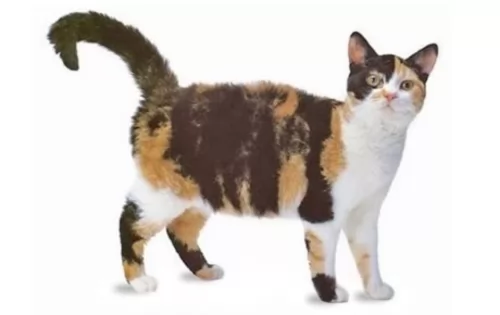 The American Wirehair makes a splendid pet, and while he isn’t the best breed for children, he can make a good pet with those children who have been taught kindness, gentleness and respect for animals.
The American Wirehair makes a splendid pet, and while he isn’t the best breed for children, he can make a good pet with those children who have been taught kindness, gentleness and respect for animals.
He is calm, quiet, dependent, and sociable and by providing him with a good home, he’ll prove to be a wonderful pet and companion.
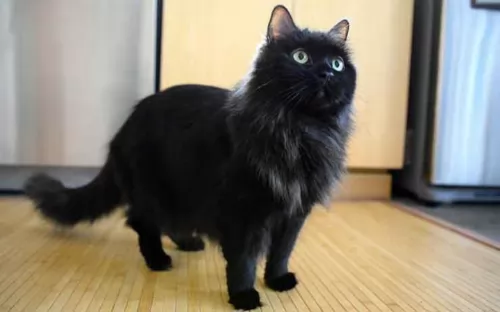 The Chantilly/Tiffany is a gentle and kind breed that is playful and easy-going. They are just your typical middle-of-the-road cats that are not too much or too little of anything.
The Chantilly/Tiffany is a gentle and kind breed that is playful and easy-going. They are just your typical middle-of-the-road cats that are not too much or too little of anything.
The Tiffany is playful, docile, happy and content and he wants to be your friend and companion.
If you are looking for a breed of cat that is loyal to its human family, allow this cat into your home... you won't have any regrets.
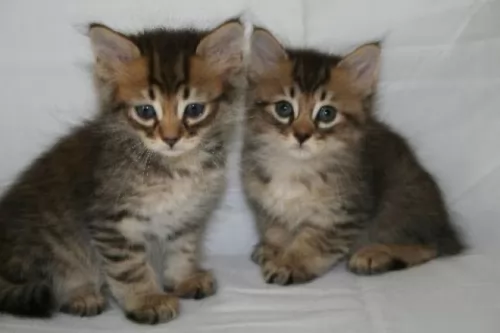 The American Wirehair is a healthy type of cat but any cat can develop health issues.
The American Wirehair is a healthy type of cat but any cat can develop health issues.
Be aware of Hypertrophic cardiomyopathy – a common form of heart disease in cats where there is the thickening of the heart muscle.
Be careful of overfeeding your cat as obesity is a major contributory disease to many illnesses that a cat gets. Excess weight can contribute to diabetes and arthritis and put pressure on your cat’s joints. Certainly, carrying extra weight can shorten your cat’s life. Make sure your cat gets smaller, healthier meals and that he is active and exercised.
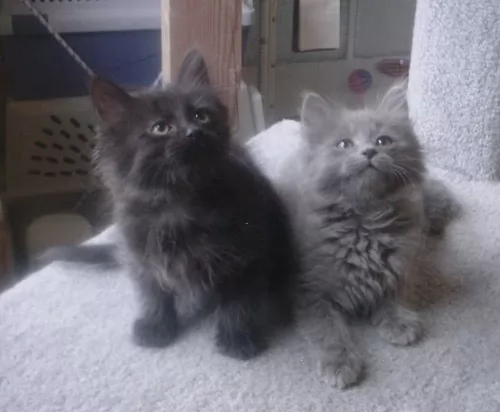 There is no health issue that the Tiffany is prone to. Like any cat, a healthy diet will keep the Tiffany healthy for years.
There is no health issue that the Tiffany is prone to. Like any cat, a healthy diet will keep the Tiffany healthy for years.
These cats are known to have delicate digestive systems so avoid foods with grain if possible. The Tiffany has full hair in their ears, and wax build-up can occur so the inside of his ears must be checked. Checking the ears once a week, as part of a regular routine that includes brushing, and tooth care, should be sufficient to keep the ear canals clear.
Other issues, which are not detrimental but should be kept in mind, are reports that the Tiffany has delicate digestion. This cat relies on a regular diet that doesn't chop and change often.
Because the Tiffany is a low-shedding cat, it is thought to be a popular breed with those people who are allergic to cat hair.
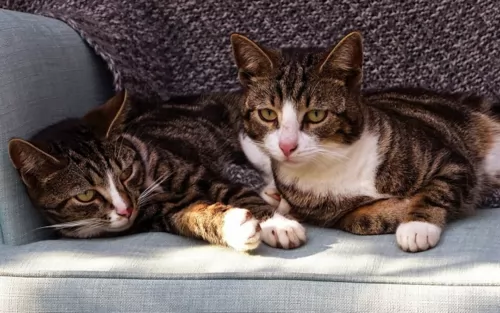 Brush the cat gently once a week. Your cat will love the connection you and he has. While you brush him, make a point of checking inside his ears and inside his mouth as well. It is also time to trim his nails. If you are hesitant to do this, ask you vet for suggestions or you can make use of a pet groomer too.
Brush the cat gently once a week. Your cat will love the connection you and he has. While you brush him, make a point of checking inside his ears and inside his mouth as well. It is also time to trim his nails. If you are hesitant to do this, ask you vet for suggestions or you can make use of a pet groomer too.
Make sure your pet cat is free from parasites such as fleas, ticks and heartworm. Your vet can recommend a treatment and it is also a good idea to talk to your vet about vaccines for your cat.
Have your American Wirehair spayed or neutered to prevent unwanted kittens and to promote better health for your cat.
Always choose healthy food for your pet, bearing in mind that cats are carnivores, which means that you need to choose cat-food for your pet that has fish and meat in it. It can be difficult making good homemade food for your cat but there are excellent commercially prepared cat foods to ensure your cat gets the correct balance of nutrients and calories. Bear in mind that your cat's nutritional requirements change through their different stages of life.
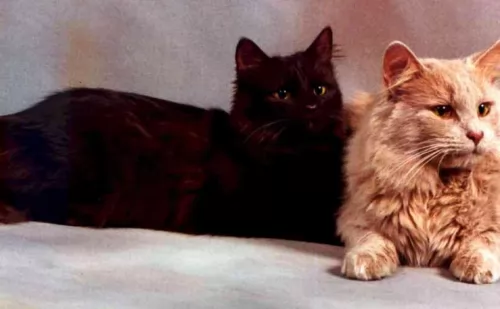 The Chantilly needs an excellet diet and exercise to ensure he doesn’t become to overweght. Remember that cats are carnivores, and this means they have nutritional requirements that can only be met with meat – they can never do well on a diet high in carbohydrates and will develop digestive problems. Your cat will also require clean, fresh water aroud thd clock to ensure his good health.
The Chantilly needs an excellet diet and exercise to ensure he doesn’t become to overweght. Remember that cats are carnivores, and this means they have nutritional requirements that can only be met with meat – they can never do well on a diet high in carbohydrates and will develop digestive problems. Your cat will also require clean, fresh water aroud thd clock to ensure his good health.
Ensure each cat you have has a litter box andencourae good litter box habits by cleaning th litter box every day. Keeping the litter box clean also alerts you anything unusual with your cat’s toilet habits.
Provide your cat with a scratching post and a climbing tree.
The cat doesn’t have an undercoat and is therefore easy to groom. With his semi-long hair, you can brush him once a week to keep the coat soft and shiny. The coat is also low shedding.
Check inside his ears and inside his mouth to ensure there is no redness and signs of infection.
Schedule regular vet visits for your cat for his cat vaccines and for when he is sick.
Spay or neuter your cat to prevent unwanted kittens. Spaying and neutering prevents uterine infections and certain cancers in the felines.